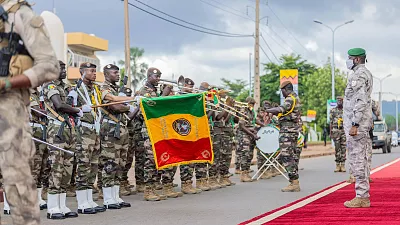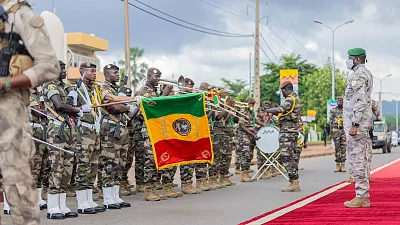
Mali marked on Sunday (Sep. 22) the 64th anniversary of its indepedence. Events took place across the nation as well as in the capital where the transitional president attended ceremonies.
Col. Assimi Goïta marked Mali’s independence Day, his fifth celebration at the helm of the Sahelian country. The address to the nation on Saturday night (Sep. 11) was dominated by the fight against terrorism and a vision for development.
Goïta celebrated the “progressive return of basic public services and key infrastructures” in the cities of Ber, Tessalit, Anéfis, Kidal and Aguelhok.
He credited the restored sovereignty over these cities to the “stabilization operations” led by the Malian military.
The country has been fighting for over a decade Islamist terrorist groups. Separatists groups in recent years started to work in sink with terror groups.
The leader of the transition notably paid tribute to the victims of the September 17 terrorist attacks on Bamako and whished a speedy recovery to the wounded.
“The attacks remind us once again the urgent need to remain vigilant and maintain an exemplary operational posture in all circomstances”, he said.
No official death toll was released folloing the attack. Seucirty officials confirmed casulaties among gendarme students and defence forces.
Tough economic context
The military ruler devoted an important section of his 16-minute speech to the economic situation in the country. Pledging to step up efforts to ease the strain on the population, Goïta listed a set of measures that were already in force to that end.
“It is worth noting that our economy suffers from the impact of security crises that have led to the hiking of military expenditures to the detriment of other sectors.”
“Despite such challenges we ‘ve maintained efficient management of public finances, keeping inflation below the regional standard of 3%.”
Towards prosperity?
Col. Assimi Goïta also outlined a vision of future prosperity, listing some developments in the agricultural and social levels.
He mentioned an increased budget devolved to local governments. In 2024, they received 440 billion CFA francs from 412 billion the previous year.
2024 also saw the launch of the general agricultural census that should “pave the way for a digitalization of farms”.
Efforts in the “hydro-agricultural planning continue” in order to “sustainably harness the full potential of the Niger and Senegal rivers”.
The nation’s energy poverty is also a priority of the government. “Numerous solar power plants are in the works” as the country seek to find the optimal “energy mix” to “boost its electricity access”.
In the field of education, the “Sikasso university [Editor’s Note: southern Mali]recently welcomed its first students. Work is ongoing so that the universities of Kayes [Editor’s Note: Western Mali] Gao, Tombouctou, and Badiagara [EN: central Mali] can be operational again.”
The transitional president held sovereignty and national unity as the key tenets of his transitional government.
“We must work to ensure that the next elections are a resounding success so that the county can continue its walks towards our revival in serenity and sovereignty”.


